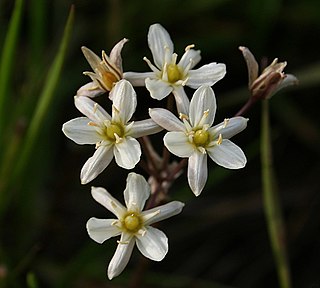
The genus Muilla includes four to five species of flowering plants.

Scilloideae is a subfamily of bulbous plants within the family Asparagaceae. Scilloideae is sometimes treated as a separate family Hyacinthaceae, named after the genus Hyacinthus. Scilloideae or Hyacinthaceae include many familiar garden plants such as Hyacinthus (hyacinths), Hyacinthoides (bluebells), Muscari and Scilla and Puschkinia. Some are important as cut flowers.

Nolinoideae is a monocot subfamily of the family Asparagaceae in the APG III system of 2009. It used to be treated as a separate family, Ruscaceae s.l. The family name is derived from the generic name of the type genus, Nolina.
Botanical nomenclature is the formal, scientific naming of plants. It is related to, but distinct from taxonomy. Plant taxonomy is concerned with grouping and classifying plants; botanical nomenclature then provides names for the results of this process. The starting point for modern botanical nomenclature is Linnaeus' Species Plantarum of 1753. Botanical nomenclature is governed by the International Code of Nomenclature for algae, fungi, and plants (ICN), which replaces the International Code of Botanical Nomenclature (ICBN). Fossil plants are also covered by the code of nomenclature.

Lomandra, commonly known as mat rushes, is a genus of perennial, herbaceous monocots in the family Asparagaceae, subfamily Lomandroideae. There are 51 species, all of which are native to Australia; two of them also extend into New Guinea and New Caledonia.

Dasylirion is a genus of North American plants in the asparagus family, all native to Mexico, with the ranges of three species also extending into the south-western United States. In the APG III classification system, it is placed in the family Asparagaceae, subfamily Nolinoideae.

Asparagaceae, known as the asparagus family, is a family of flowering plants, placed in the order Asparagales of the monocots. The family name is based on the edible garden asparagus, Asparagus officinalis. This family includes both common garden plants as well as common houseplants. The garden plants include asparagus, yucca, bluebell, and hosta, and the houseplants include snake plant, corn cane, spider plant, and plumosus fern.

Lomandroideae is a subfamily of monocot flowering plants in the family Asparagaceae, order Asparagales, according to the APG III system of 2009. The subfamily name is derived from the generic name of the type genus, Lomandra. The group has previously been treated as a separate family Laxmanniaceae. In the Kubitzki system, it is treated as Lomandraceae Lotsy.
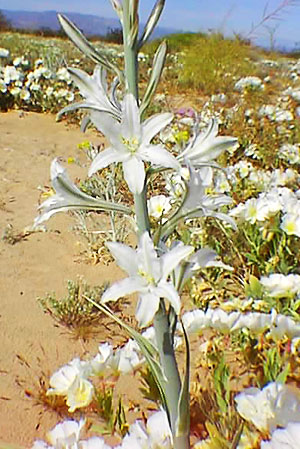
Hesperocallis is a genus of flowering plants that includes a single species, Hesperocallis undulata, known as the desert lily or ajo lily.

Aphyllanthes is a genus of flowering plants with only one species, Aphyllanthes monspeliensis, endemic to the western Mediterranean region. It is the only genus in the Aphyllanthoideae, a subfamily of the family Asparagaceae. Aphyllanthoideae was formerly treated as a separate family, Aphyllanthaceae.
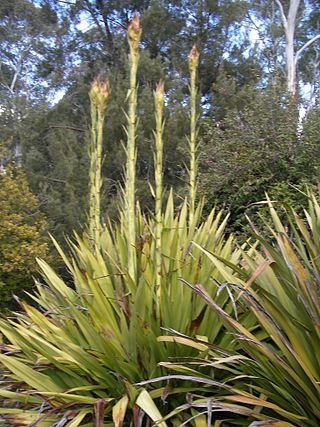
Doryanthes is the sole genus in the flowering plant family Doryanthaceae. The genus consists of two species, D. excelsa and D. palmeri, both endemic natives of the coast of Eastern Australia. Doryanthaceae is part of the order Asparagales.

Eriospermum is a genus of tuberous flowering plants. It contains about 80-100 species, native to sub-Saharan Africa.

Acanthocarpus is a genus in the family Asparagaceae, subfamily Lomandroideae, in the APG III system of classification. It has been difficult to place at family rank, being placed at various times in Dasypogonaceae as well as the Asparagaceae. The entire genus is endemic to the State of Western Australia.
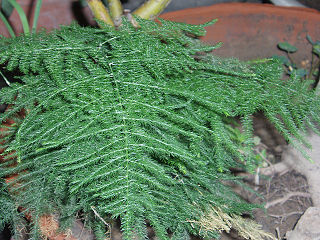
Asparagoideae is a subfamily of monocot flowering plants in the family Asparagaceae, order Asparagales, according to the APG III system of 2009. The subfamily name is derived from the generic name of the type genus, Asparagus. The group has previously been treated as a separate family Asparagaceae sensu stricto.
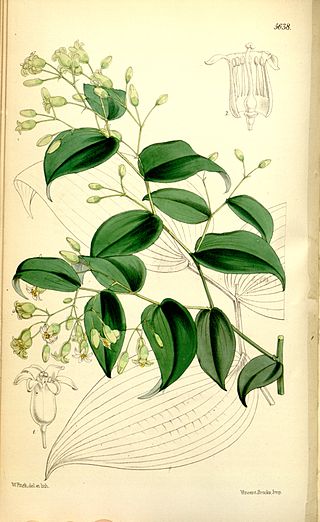
Behnia is a genus of flowering plants. In the APG III classification system, it is placed in the family Asparagaceae, subfamily Agavoideae. There is only one known species, Behnia reticulata, a climber plant native to southern Africa.
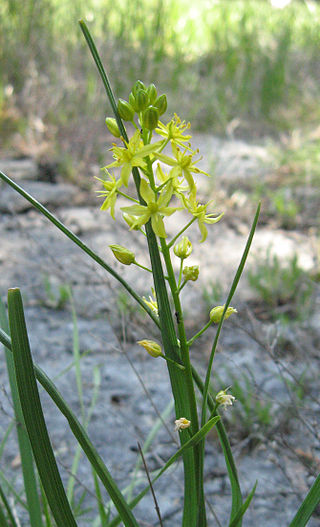
Schoenolirion, rush-lily or sunnybell, is a genus of three recognized species of flowering plants, all endemic to the southeastern United States. In the APG III classification system, the genus is placed in the family Asparagaceae, subfamily Agavoideae.
Hemiphylacus is a genus of flowering plants endemic to Mexico. In the APG III classification system, it is placed in the family Asparagaceae, subfamily Asparagoideae.
Petronymphe is a genus of flowering plants endemic to Mexico. In the APG III classification system, it is placed in the family Asparagaceae, subfamily Brodiaeoideae.

Comospermum is a genus of one species of flowering plant found in southern Japan. In the APG III classification system, it is placed in the family Asparagaceae, subfamily Nolinoideae.

Speirantha is a genus of one known species of flowering plants found in south-east China. In the APG III classification system, it is placed in the family Asparagaceae, subfamily Nolinoideae.
















